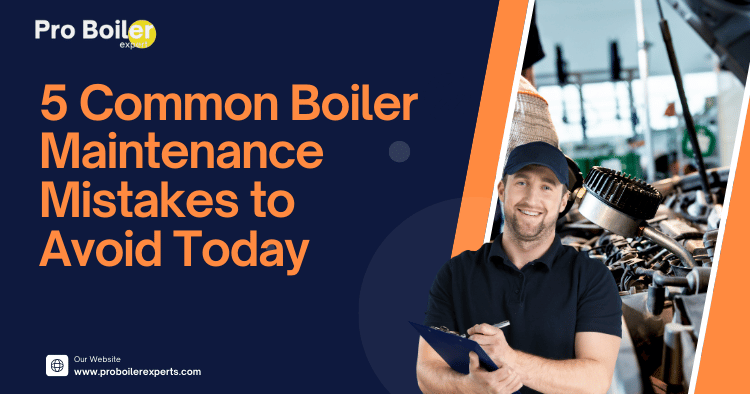Table of Contents
- Introduction
- Mistake 1: Ignoring Regular Inspections
- Mistake 2: Skipping the Annual Service
- Mistake 3: Neglecting the Pressure Gauge
- Mistake 4: Overlooking Strange Noises
- Mistake 5: DIY Repairs Without Knowledge
- Conclusion
- FAQs
Introduction
Boilers are the unsung heroes of our homes, providing warmth and hot water, especially during the chilly months. However, like any machinery, they require regular maintenance to operate efficiently. Unfortunately, many homeowners make common mistakes that can lead to costly repairs or even complete breakdowns. In this article, we’ll explore five common boiler maintenance mistakes you should avoid to keep your system running smoothly and efficiently.
Mistake 1: Ignoring Regular Inspections
One of the most significant mistakes homeowners make is ignoring the need for regular inspections. Boilers should be checked at least once a year by a qualified technician. Regular inspections can help identify potential issues before they escalate into costly repairs.
Why Regular Inspections Matter
- Safety: Regular inspections ensure that your boiler operates safely, minimizing the risk of gas leaks or carbon monoxide poisoning.
- Efficiency: Inspections can improve energy efficiency, which can save you money on your utility bills.
- Longevity: A well-maintained boiler can last longer, providing you with reliable service for years.
For more information on why inspections are crucial, visit Energy.gov. Also, consider reading about the top energy efficiency standards for boiler installations in 2024 to understand how efficiency impacts your home.
Mistake 2: Skipping the Annual Service
Many homeowners believe that if their boiler is functioning well, there’s no need for annual servicing. This couldn’t be further from the truth. Annual service by a qualified technician not only ensures that your boiler is running efficiently but also helps maintain its warranty.
What Annual Service Includes
- Cleaning: Removal of dirt and debris helps improve efficiency.
- Checking Components: A technician will check all components, including burners, heat exchangers, and safety controls.
- Testing: Ensuring that everything operates correctly can prevent future issues.
Benefits of Annual Servicing
- Prevents Breakdowns: Catching small issues before they become major problems.
- Saves Money: Lower energy bills and fewer emergency repairs.
- Peace of Mind: Knowing your boiler is in good shape.
For detailed service guidelines, check out Which?. You may also want to look at the essential pre-installation checklist for your new boiler to prepare for future installations.
Mistake 3: Neglecting the Pressure Gauge
The pressure gauge is a critical component of your boiler that often goes unnoticed. A correctly functioning pressure gauge ensures that your boiler operates at the right pressure level. If the pressure is too high or too low, it can lead to inefficient performance or even damage to the system.
What to Look For
- Normal Pressure Range: Typically, a pressure reading between 1 and 1.5 bar is ideal for most residential boilers.
- Signs of Trouble: If the gauge consistently shows low pressure, it might indicate a leak or an issue with the pressure relief valve.
What To Do
- Monitor Regularly: Check the gauge monthly to ensure it remains within the normal range.
- Consult a Professional: If you notice fluctuations, call a technician to diagnose the problem.
For a deeper understanding of potential issues, refer to gas vs. oil boilers: 5 key differences to evaluate your options and ensure proper maintenance.
Mistake 4: Overlooking Strange Noises
Hearing strange noises from your boiler can be alarming, yet many homeowners ignore them, thinking they are just a normal part of the system’s operation. However, unusual sounds can be a sign of underlying problems that require immediate attention.
Common Noises to Watch For
- Banging or Clanging: Often indicates a buildup of limescale or air in the system.
- Whistling: This could suggest a blockage or low water pressure.
- Gurgling: Usually a sign of trapped air or low water levels.
Importance of Addressing Noises
Ignoring these sounds can lead to more severe issues, including system failure. Addressing them promptly can save you from extensive repairs.
For additional insights, consider reading about the top 5 benefits of choosing combi boilers to understand the advantages of different boiler types.
Mistake 5: DIY Repairs Without Knowledge
While DIY projects can be a fun way to save money, when it comes to boiler repairs, it’s essential to know your limits. Many homeowners attempt to fix issues themselves, which can lead to further damage or safety risks.
Risks of DIY Boiler Repairs
- Safety Hazards: Gas leaks and carbon monoxide exposure are serious risks.
- Voiding Warranties: Many manufacturers require professional servicing to maintain warranty coverage.
- Wasted Time and Money: Improper repairs can lead to more extensive issues, costing you more in the long run.
What to Do Instead
- Hire a Professional: Always consult a certified technician for repairs and maintenance.
- Educate Yourself: Familiarize yourself with your boiler’s manual and basic troubleshooting techniques.
For more on choosing the right boiler installer, visit top 5 tips for choosing the right boiler installer.
Conclusion
By avoiding these common boiler maintenance mistakes, you can ensure your system runs efficiently and safely for years to come. Regular inspections, annual servicing, monitoring pressure, addressing strange noises, and knowing when to call a professional are all vital steps in boiler maintenance. Take care of your boiler, and it will take care of you!
FAQs
Q: How often should I have my boiler serviced?
A: It’s recommended to service your boiler at least once a year to ensure it operates efficiently and safely.
Q: What should I do if I notice a leak?
A: If you notice a leak, turn off the boiler immediately and contact a qualified technician for repairs.
Q: Can I fix my boiler myself?
A: While minor troubleshooting can be done, it’s best to leave repairs to a certified professional to avoid safety risks.
Q: How can I improve my boiler’s efficiency?
A: Regular servicing, bleeding radiators, and ensuring proper insulation can all help improve your boiler’s efficiency.
For more information on boiler maintenance, visit The Boiler Guide.
By following these tips and avoiding common pitfalls, you can enjoy a warm and safe home all winter long!




